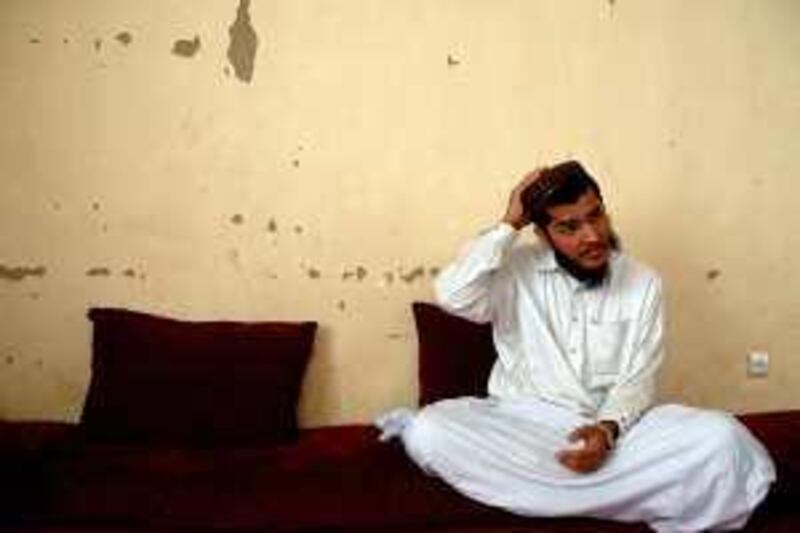KABUL // As the Obama administration inches toward closing the Guantanamo Bay detention centre, Afghanistan is already struggling to deal with the bitter legacy it and other prisons are leaving behind. Officials and a former inmate are unanimous in believing that the growing insurgency is partly inspired by a sense of anger over how Taliban and al Qa'eda suspects are treated here and overseas.
Some allege that the entire justice system remains deeply flawed and counter-productive, as many innocent civilians are arrested and moderates turned into extremists. Sayed Sharif Sharif heads the Afghan government commission responsible for checking on the status of detainees at Guantanamo and Bagram air base, north of Kabul. He said he believes both prisons should be shut down and claims that civilians are still being arrested too often because of faulty intelligence and misunderstandings.
"The Americans are not familiar with Afghanistan, with the culture, the people, the area. That's why they are making these mistakes. And of course if they are putting someone in jail without any reason and abusing him for two or three years, then when he is released he will do a suicide attack or take up arms and fight, especially against the international troops. "In my opinion, the fighting has also increased because of this," Mr Sharif said.
One of Barack Obama's first acts on becoming the US president was to order the closing of Guantanamo Bay within a year. But although a handful of detainees have since been transferred to other countries, about 220 remain there. Mr Sharif said US officials "don't have 100 per cent cooperation with us", when it comes to the facility, where "23 or 24" Afghans are still being held. Requests from the commission to release some of those detainees have been refused, he added.
Of perhaps greater concern to people here is the detention centre at Bagram, which has been kept out of the global spotlight despite widespread allegations of mistreatment and torture of those interned there. Under new rules recently introduced by Mr Obama, prisoners there will continue to be refused access to lawyers. Instead, a military official will be assigned to them to collect evidence that might lead to their release. Unlike at Guantanamo, the White House insists they should not be allowed to challenge their detention in US courts.
Mr Sharif condemned the move, saying all prisoners must be allowed to choose their own legal counsel. His organisation visits Bagram twice a month, but others are not so lucky. The Afghanistan Independent Human Rights Commission spent more than 18 months in negotiations with US military and civilian officials to gain access to the detention centre. A draft memorandum of understanding has been drawn up, yet members have still not been allowed inside.
Mohammed Farid Hamidi, a commissioner, said: "We have seen a very positive reaction in Obama's policy and we are supporting that, but it's not enough for us. They made the decision to close Guantanamo Bay, but they didn't say anything about Bagram and I think the situation is worse there." Roughly 600 foreign and Afghan detainees are held at Bagram, which has room for 1,000 inmates. A new, bigger prison complex is due to be opened there soon.
Facilities under US control are not the only source of controversy. Pul-i-Charkhi, on the outskirts of Kabul, holds suspected militants as well as common criminals. An Afghan jail that gained notoriety as a centre of torture and disappearances during the Communist era, it is now infamous for different reasons. The human rights commission has access to Pul-i-Charkhi and Mr Hamidi said his concerns include prisoners' rights, living conditions, the overcrowding of detention facilities and length of time it takes for courts to come to decisions.
Rohullah Qarizada, the president of the Independent Bar Association of Afghanistan, claimed that the intelligence service often forbade defence lawyers from meeting prisoners during investigations. Cases drag on for longer than 10 months before any sentence is handed down, he said. Doubts about the prison system have even been raised by Gen Stanley McChrystal, the head of US and Nato forces. In a recently leaked report on the war, he said: "Committed Islamists are indiscriminately mixed with petty criminals and sex offenders, and they are using the opportunity to radicalise and indoctrinate them." Meanwhile, in Bagram "hundreds are held without charge or without a defined way ahead".
Mohammed Jawad is a living testament to the human cost of all this. He claims to have been just 12 when it was alleged he planned to carry out a grenade attack in Kabul in 2002. Taken first to an Afghan police station, his nose was broken when he was hit in the face with a pistol, and he was told to confess. He was soon transferred to US custody, detained at Bagram for 49 days and then flown to Guantanamo Bay.
A photograph of him before his ordeal shows a boy virtually unrecognisable from the 19-year-old man who, after his release in the summer, described being stripped naked, choked, slammed against walls and often held in isolation during this time. "The people who are in these two jails are all Muslims. The Americans are not respecting their religion and they are not respecting them as humans," he said.
Now back in Kabul, he finds himself caught up in a war that has grown noticeably fiercer in the years he has been away. "The situation will get worse because it's impossible to finish fighting with fighting," he said. "It's impossible to clean blood with blood." csands@thenational.ae






